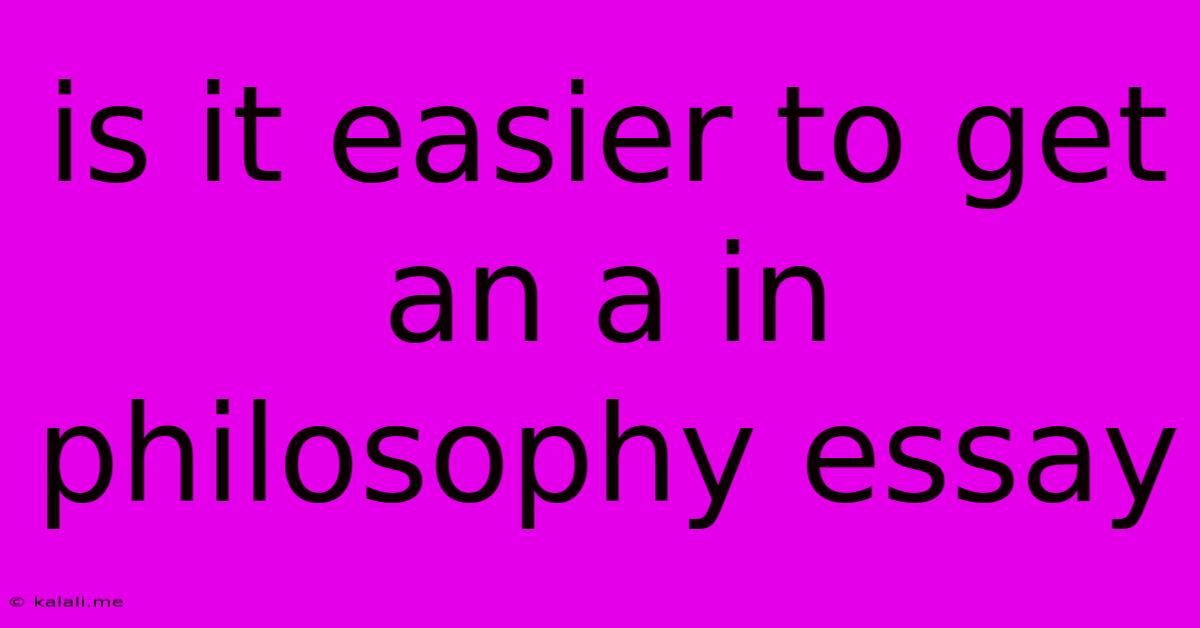Is It Easier To Get An A In Philosophy Essay
Kalali
May 31, 2025 · 3 min read

Table of Contents
Is It Easier to Get an A in a Philosophy Essay? A Deep Dive into Argumentation and Analysis
Getting an A in any essay is challenging, requiring meticulous planning, strong argumentation, and clear writing. But is it easier to achieve top marks in a philosophy essay compared to, say, a history or literature essay? The answer is nuanced. While the grading criteria might seem straightforward – strong argumentation, clear writing, and insightful analysis – the reality is more complex and depends on various factors. This article explores the unique aspects of philosophical essay writing that can make it easier (or harder) to achieve an A.
What Makes a Philosophy Essay Different?
Unlike essays in other disciplines, philosophy essays primarily focus on critical thinking, logical reasoning, and argument construction. Instead of simply summarizing information, you're expected to engage in rigorous argumentation, defending a thesis through reasoned arguments and addressing potential counterarguments. This emphasis on logical structure can be both a blessing and a curse.
Arguments for Easier A's:
-
Clear Grading Rubric: Philosophy essays often have a clear grading rubric focusing on argumentative strength, clarity of reasoning, and the effective use of philosophical concepts. This transparency can make it easier to understand what's required to achieve a high grade. Knowing the specific criteria allows for targeted preparation.
-
Structure and Logic: The emphasis on logical structure can be advantageous. A well-structured argument, even if not entirely original, can still secure a good grade. Mastering the art of constructing a sound argument, using clear premises and logical inferences, is a skill that can be learned and perfected.
-
Focus on Reason, Not Evidence: Unlike history or literature essays that often require substantial evidence gathering, philosophy essays prioritize reasoned argumentation over empirical evidence. While evidence might be used to support claims, the core of the essay lies in the logical coherence of the argument itself. This can simplify the research process.
-
Flexibility in Interpretation: While there are established philosophical positions, there's often room for nuanced interpretations and original arguments. This creative freedom can be rewarding and allows for more personal expression within a rigorous framework.
Arguments Against Easier A's:
-
High Level of Abstraction: Philosophical concepts can be highly abstract and challenging to grasp. Understanding and applying these concepts correctly requires significant intellectual effort and a deep understanding of the relevant philosophical literature.
-
Precise Language: Philosophical writing demands precision in language. Ambiguity can undermine the entire argument, so clarity and accuracy are paramount. This requires careful crafting of sentences and paragraphs.
-
Rigorous Analysis: Successfully analyzing complex philosophical arguments and identifying potential flaws requires a high level of critical thinking skills, which take time and practice to develop.
-
Originality is Challenging: While some flexibility exists, achieving an A often requires originality, demonstrating a novel insight or presenting a unique perspective on a philosophical problem. This is a significant hurdle.
Tips for Achieving an A:
-
Master the Basics: Ensure you understand fundamental concepts like argumentation, validity, soundness, and fallacies.
-
Practice Constructing Arguments: Regularly practice constructing arguments, both for and against different philosophical positions.
-
Read Widely and Critically: Engage with diverse philosophical perspectives and critically evaluate the arguments presented.
-
Seek Feedback: Don't hesitate to ask your professor or teaching assistant for feedback on your drafts.
-
Revise and Refine: Philosophy essays rarely come out perfectly on the first draft. Revision and refinement are essential to achieve excellence.
In conclusion, while the grading criteria for a philosophy essay might appear straightforward, achieving an A requires a high level of skill in critical thinking, argumentation, and precise writing. The emphasis on logical structure can simplify aspects of the process, but the abstract nature of philosophical concepts and the demand for originality present significant challenges. Ultimately, success depends on a combination of understanding fundamental philosophical principles, meticulous planning, and consistent effort.
Latest Posts
Latest Posts
-
Too Much Imidazole In Appel Reaction
Jun 01, 2025
-
Arriba Abajo Al Centro Pa Dentro
Jun 01, 2025
-
How To Get Mold Off Concrete
Jun 01, 2025
-
How To Stop Glasses From Sliding
Jun 01, 2025
-
How To Get Encoding Of A File
Jun 01, 2025
Related Post
Thank you for visiting our website which covers about Is It Easier To Get An A In Philosophy Essay . We hope the information provided has been useful to you. Feel free to contact us if you have any questions or need further assistance. See you next time and don't miss to bookmark.